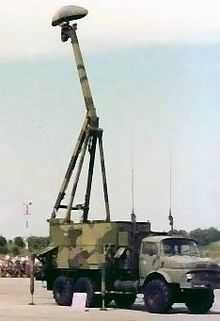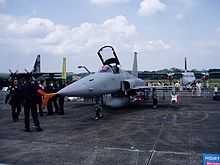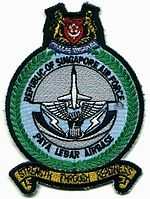Paya Lebar Air Base
| Paya Lebar Air Base (PLAB) 巴耶利峇空军基地 Pangkalan Udara Paya Lebar | |||||||||||
|---|---|---|---|---|---|---|---|---|---|---|---|
|
Paya Lebar Air Base Crest Badge | |||||||||||
| IATA: QPG – ICAO: WSAP | |||||||||||
| Summary | |||||||||||
| Airport type | Military airbase | ||||||||||
| Owner | Ministry of Defence (Singapore) | ||||||||||
| Operator | Republic of Singapore Air Force | ||||||||||
| Location | Paya Lebar, Singapore | ||||||||||
| Elevation AMSL | 65 ft / 20 m | ||||||||||
| Coordinates | 01°21′37″N 103°54′34″E / 1.36028°N 103.90944°E | ||||||||||
| Runways | |||||||||||
| |||||||||||
Paya Lebar Air Base (Simplified Chinese: 巴耶利峇空军基地; Malay: Pangkalan Udara Paya Lebar) (IATA: QPG, ICAO: WSAP) is a military airbase of the Republic of Singapore Air Force located at Paya Lebar, in the central-eastern part of Singapore, the airbase goes by the motto of "Strength Through Readiness".
Originally built in 1954 as Singapore International Airport to replace Kallang Airport, control of the airport was transferred to RSAF in 1980 when it was renamed Paya Lebar Air Base, following the relocation of the civilian airport to Changi.
History
|
| |
|
| |
|
|
The airport was built from 1952 to 1955, and opened on 20 August 1955 by the Secretary of State for Colonies, Alan Lennox-Boyd.[3] The architect for the project was J. J. Bryan, a public works engineer with experience constructing airports in Malaya and India.[4]
It was a hub for Malayan Airways at this time (the other being Kuala Lumpur), and the airline had its first flight outside Southeast Asia in 1958, using a DC-4 leased from Qantas, flying to Hong Kong. Turboprops were introduced over the next few years, and the name was changed to Malaysian Airways. In 1962 a joint RAF/Singapore civil Air Traffic Control service was formed to provide Military cover for Air Defence. During that time Britannia aircraft of British Eagle provided transport for UK military. Comet 4C's were common traffic and the new VC10 arrived reducing flight time, (using UK and Singapore time it was theoretically possible to land before it had taken off) rather than the 24hrs-with stops- of the Britannia.
In 1966, the company focused more on Singapore, buying Boeing 707s, headquartering itself in that country, and renaming itself Malaysia-Singapore Airlines - with a notable fluorescent yellow livery. Its primary hub became Paya Lebar, and services began to reach out further into North Asia.
From 1979 to 1980, British Airways, in conjunction with Singapore Airlines, began supersonic Concorde services from London's Heathrow Airport, to Paya Lebar Singapore.
Malaysia-Singapore Airlines was dissolved in 1972; Malaysia Airlines and Singapore Airlines were formed - the latter keeping all the 707s; and Singapore Airlines remained at Paya Lebar. But passenger numbers rose from 1.7 million to 4 million between 1970 and 1975. The airport was constrained by housing estates and although some work was done to keep it operational in the meantime, construction began on the present Singapore International Airport at Changi in 1975, opening in 1981. Paya Lebar then closed to civil traffic, and Changi took over Paya Lebar's IATA code of SIN.
Conversion to military use
Paya Lebar began to be gradually converted into a military air-force base from Late 1967 onwards. During that year, an Air Movement Centre was constructed to handle passengers and cargo arriving on Republic of Singapore Air Force flights, Ministry of Defence charter flights and foreign military aircraft. The original terminal building (painted green), maintenance hangar and control tower are retained. Access to terminal and hangars are off limits closed off by wired fence. It became a complete military airbase in 1981 when Singapore Changi Airport was opened and was subsequently renamed as Paya Lebar Air Base (PLAB) on the same year.
Paya Lebar Air Base
The air base currently houses aircraft such as the C-130 Hercules[5] and the upgraded AMRAAM capable F-5S/T Tiger IIs.
The Flying squadrons are:
- 122 Squadron with 10 C-130 Hercules,
- 141 Squadron with 7 F-5S/T Tiger-IIs before it was disbanded in Nov 2005,
- 144 Squadron with 22 F-5S/T Tiger-IIs,
- 149 Squadron with 16 F-5S/T Tiger-IIs; currently transitioning to the F-15SG (Strike)[6]
The Support Squadrons are:
- Air Logistics Squadron (ALS)
- Airfield Maintenance Squadron (AMS)
- Field Defence Squadron (FDS)
- Flying Support Squadron (FSS)
US presence
Besides being used by various flying units of United States Air Force and United States Navy (including United States Marine Corps Aviation) as a refuelling stopover and staging post/transit point, the base is also used permanently by the 497th Combat Training Squadron for other flight operations since 31 October 1991.[7]
Paya Lebar Air Base also plays host to USAF VIP aircraft as well. Air Force One landed at the base during President George W. Bush's two visits to Singapore in October 2003 and November 2006.
Air Force Two carrying Vice President Dick Cheney also made a refueling stop en route from Australia in 2007.
The USAF Boeing 747-200 E-4B regularly lands at the base when the U.S. Secretary of Defense visits Singapore, as does the Boeing 757 C-32A that carries the Secretary of State.
Most recently, on 14 November 2009, Air Force One carrying President Barack Obama landed at Paya Lebar Air Base, to attend the APEC Singapore 2009 Summit.
Photo gallery
-

1988, a GIRAFFE S 3D radar on display at Paya Lebar Air Base
-
An RSAF C-130H performing short field landing at PLAB
-

An AGM-65 Maverick armed Northrop F-5S Tiger-II
-
2008, Squadron personnel and staff of 149 Sqn based at PLAB posing in front of the squadron's F-5S Tiger-IIs after winning the Best RSAF Unit award. In 2010, the Sqn transitioned to the new F-15SG Strike Eagles.
Air Force Museum
| Wikimedia Commons has media related to Republic of Singapore Air Force Museum. |
The RSAF maintains the Air Force Museum, which is open to the public and showcases the air force's history and capabilities. The museum is located along Airport Road beside the airbase.
RSAF Open House
The RSAF Open House is a bi-annual event which is usually held at Paya Lebar Air Base and in conjunction with the 40th Anniversary of Republic of Singapore Air Force in 2008,[8] it was open to the public for two days from 30 August to 31 August 2008.[9] Also, the RSAF Black Knights was present for another aerobatic display to thrill the crowds.
Legacy
The old passenger terminal building and control tower still stand, though they now house air force units and are off limits to the public. Nevertheless, much of the interior still remains intact and is almost completely preserved from the time it was first built.[10] The road which used to lead to the old passenger terminal is also still known as Airport Road.
See also
- 497th Combat Training Squadron
- Task Force 73/Commander, Logistics Group Western Pacific
References
- Notes
- ↑ Airport information for WSAP at World Aero Data. Data current as of October 2006.Source: DAFIF.
- ↑ Airport information for QPG at Great Circle Mapper. Source: DAFIF (effective Oct. 2006).
- ↑ "'The Door to Singapore'". The Straits Times. 21 August 1955. Retrieved 21 March 2014.
- ↑ Kraal, Ivor (14 August 1955). "Singapore's Great Day". The Straits Times. Retrieved 21 March 2014.
- ↑ Leong, Wai Kit. "Two C-130 aircraft from Singapore scour seas for QZ8501". Channel NewsAsia. Retrieved 29 December 2014.
- ↑ "Inauguration of the RSAF's First Local F-15SG Squadron". MINDEF press release. 2010-04-05. Retrieved 2010-04-05.
- ↑ "497th Combat Training Squadron (497th CTS)". United States Embassy to Singapore. Retrieved 7 July 2011.
- ↑ "40th Anniversary of RSAF". MINDEF. Retrieved 11 May 2010.
- ↑ "RSAF Open House 2008". MINDEF.
- ↑ Daven Wu (6 May 2009). "Paya Lebar Airport, Singapore". IPC Media's Wallpaper*. Retrieved 11 May 2010.
External links
- RSAF web page on Paya Lebar Air Base (PLAB)
- Current weather for WSAP at NOAA/NWS
- Accident history for QPG at Aviation Safety Network


